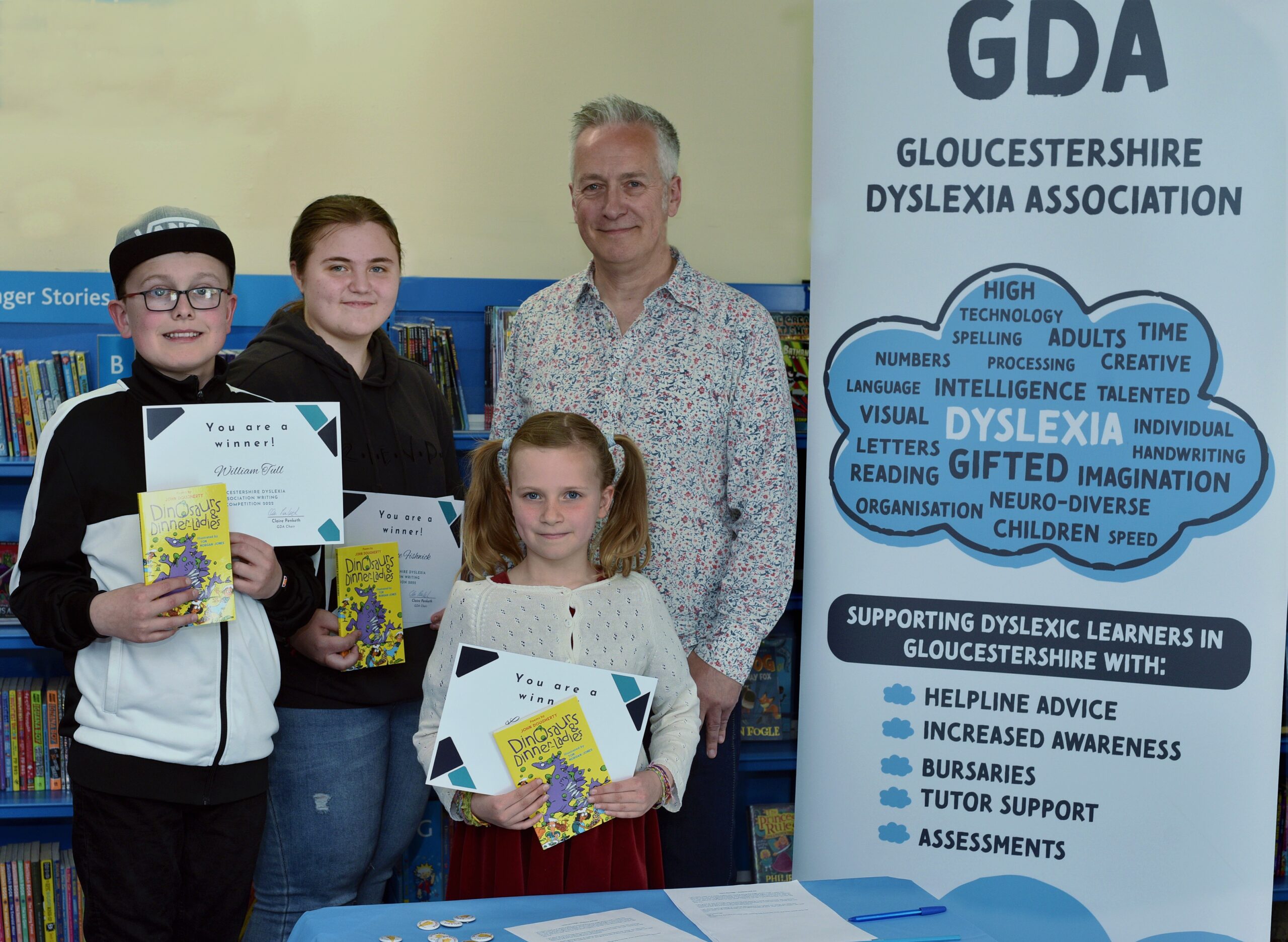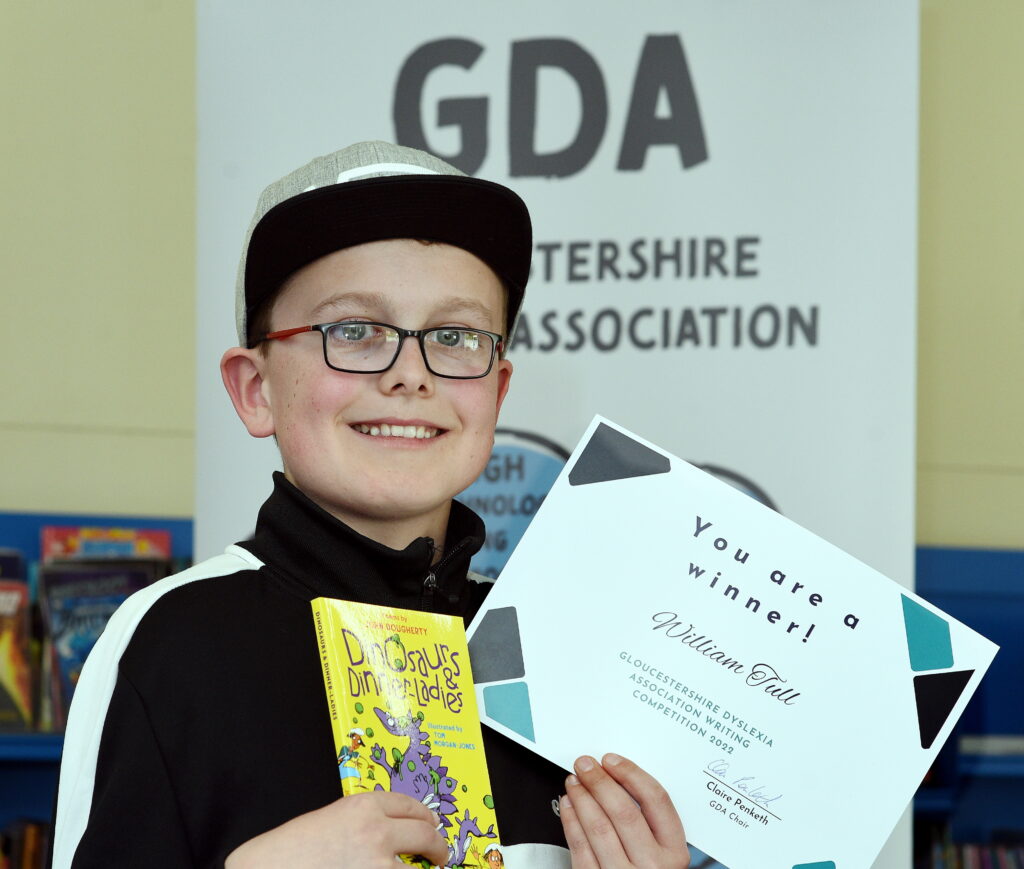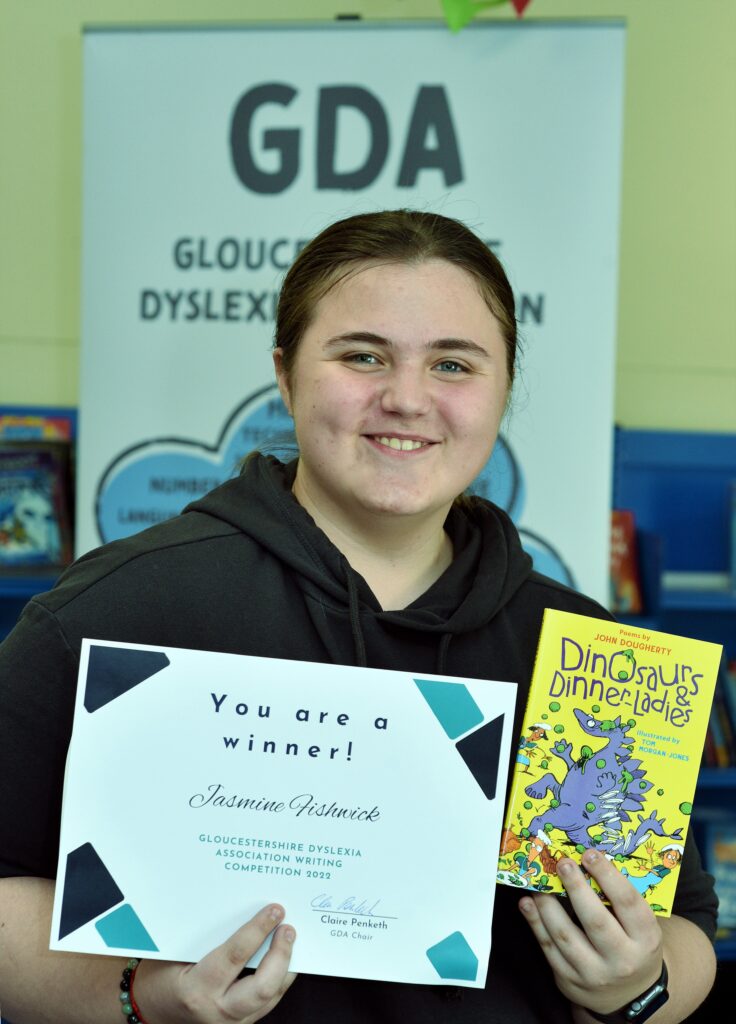Gloucestershire Dyslexia Association

Thursday, 11 April, 2024
According to the British Dyslexia Association (BDA), around 10% of the British population is dyslexic. Senior Lecturer in SpLD/Dyslexia and Inclusion, Dr Georgia Niolaki, is increasing awareness and helping create systems to better support people with dyslexia through her research and outreach initiatives.
Georgia, along with colleagues from the Gloucestershire Dyslexia Association (GDA) and Birmingham City University, is working on a knowledge exchange project with schools in the region to increase dyslexia awareness and help create bespoke support plans for learners with dyslexia.
Talking about how the project came about, Georgia said:
“I was aware at the time of the Arts and Humanities Research Council (AHRC) Impact Accelerator award. This sparked the idea to approach [GDA Chair of Trustees] Clair Penketh and my colleague from Birmingham City University, Dr Aris Terzopoulos. We were all very excited about the project as there is research evidence that to support students with dyslexia, teachers need a sound knowledge of it first.”
With advice and feedback from the GDA, the group developed and delivered a series of workshops in six schools around the region. They also created a pre-workshop survey to capture the specific areas and topics the teachers wanted to receive training on.
“In that way, the support workshops and the knowledge exchange initiative would be meaningful and tailored to their needs and the needs of the local schools,” Georgia said.
To further support learners and the local community, the project received an HEQR seed funding grant to create bespoke interventions to support reading, spelling, writing and coping strategies, and target the need for teaching and managing dyslexia. Importantly, they are tailored to the specific needs and strengths of each learner.
The group will present evidence for the effectiveness of the intervention at the British Dyslexia Association International Conference later this year.
Georgia was also recently invited by BBC Bristol to talk about dyslexia in the creative sector. The panel discussion was recorded and is being shared with other BBC branches in the UK as part of their inclusion agenda.
During the discussion, Georgia explained how dyslexia isn’t just one thing; it affects people in different ways, and while people with dyslexia may face a lot of challenges – particularly within a learning environment – they also bring their own unique strengths:
“Whenever I do an assessment of an individual who has dyslexia, I always start with their strengths. So it might be visual memory, it might be reasoning, it might be verbal abilities, or they may be an amazing communicator.”
There’s also evidence to suggest that dyslexic people make up a large proportion of people in the creative sector. Reflecting on this, Georgia said:
“There was an amazing study about art students, and there was a huge proportion of dyslexic learners in the representation of artistic subjects that were explored in this particular study. We need more research, but definitely there is evidence that individuals who have dyslexia are drawn towards the creative industries.”
Georgia’s work ultimately strives to raise awareness around the challenges that dyslexic people face and how to better accommodate them, but perhaps more importantly, it’s about recognising each person’s strengths and creating an environment in which they can thrive.
Georgia said:
“If someone says that dyslexia is a disability, then basically that’s society putting up barriers for and disabling the individual. It’s not a disability. Dyslexic people have amazing strengths and amazing abilities, if we allow them to express themselves in the best ways that they can.”
Collaboration with Bath SpA
In December 2022 we supported Dr. Georgia Niolaki and Dr. Aris Terzopoulos of Bath SPA university and kicked off a project to raise awareness of Dyslexia in primary and secondary schools. We undertook four workshops with a variety of schools within the Gloucestershire community.
This has now been followed up with another exciting opportunity to build on the work we did earlier in the year and undertake a new Dyslexia Intervention Pilot in two other Gloucestershire schools in conjunction with Bath Spa University.
Dyslexia Intervention Pilot
Georgia Niolaki and Aris Terzopoulos are sharing their passion and expertise in supporting dyslexic learners by trialling a bespoke intervention that aims to improve not only literacy skills, but the individual’s confidence and self-esteem.
We are fortunate to be working with two schools – St Mark’s Primary School in Cheltenham and Rednock Secondary School in Dursley. Preparations are underway for the intervention to start in early November. Each school is looking forward to their training, and to start developing their own knowledge and skills, in addition to those of their students. The pilot will culminate with Georgia sharing the results at the British Dyslexia Conference in June 2024, with the aim of extending the reach of the intervention to support more dyslexic students and schools. Watch this space for updates on their progress!

Stroud market

As you will know, October was Dyslexia Awareness Month and at GDA we kicked this off a day early with a stall at Stroud Market on 30th September.
We met a lot of people and had good chats about dyslexia, gave advice and heard success stories.
We especially loved meeting Rebecca Ashdown illustrator of Thunderboots, the children’s book which celebrates the positives of thinking differently. Written by Naomi Jones.
Stroud Imagines and the GDA
Claire Penketh, Chair of the GDA and her 18-year-old son Tom were speakers at an event held in May by Stroud Imagines on the issue of Neurodiversity. The Stroud Imagines forum is held monthly at the Community interest company, the Long Table on the outskirts of the town and seeks to explore different ways that communities and society could live, learn and work more effectively together.
Claire spoke about what it was like going to college and university in the 1980s when dyslexia was not understood or widely recognised. She was lucky to have had a tutor and a professor who did understand, and she got a degree and became a journalist. She chose broadcasting because, at that time, being able to spell was not a critical part of the job.
Claire also explained that it is not just spelling and grammar that trip up dyslexics. The planning and organisation of both time and tasks can be an uphill struggle and this can be enormously frustrating for those who are working with dyslexic colleagues.
She also described how, despite the greater understanding now of the challenges dyslexic people face, it remains a struggle to get help in schools, and at work for those who need additional time or support to organise their days to ensure they complete daily tasks.
Claire’s son Tom spoke about his own journey to get an Education, Health Care Plan and how despite this he still faced unhelpful reactions from some teachers. One complained about him setting up his laptop in lessons, which he needed to do to type out notes, claiming he “disturbed the other hardworking students.” This felt unjust when he had to undertake these extra tasks to keep up with the class. He did however highlight that when he received the support he needed from the school and the GDA, he achieved nine GCSEs, and was studying for three A Levels.
The other two speakers at the event, Sarah and Gavin, described what it’s like to have ADHD and autism and how they had met those challenges. The conclusion was that thinking and behaving differently can be challenging, but a little understanding and empathy from others goes a long way. Although neurodiversity presents its own challenges, many neurodiverse individuals are amazingly creative and can provide insights that astonish colleagues and employers.
Conclusion
It is tempting to see the progress that has been made over the last thirty years in the understanding and support that is available for dyslexics and feel that there is little more that needs to be done but it is also clear that although information is available it is often difficult to find it and there are broad swathes of people who have little understanding of what is like to face the challenges that Sarah, Gavin, Tom and Claire have highlighted.
On the next couple of pages there are a number of sources of information that might support you and your families if you are starting out on, or already on the learning journey. Please do contact our helpline if you would like further information or advice and we will do our best to support you.
Esteemed Academics secure funding in partnership with Gloucestershire Dyslexia Association
Dr Georgia Niolaki & Dr Aris Terzopoulos are collaborating with the Gloucestershire Dyslexia Association to offer local school teachers the opportunity to sign up for free workshops which will help them learn about and understand dyslexia.
The practical workshops will include:
Georgia, a specialist dyslexia advisor, assessor and Senior Lecturer at Bath Spa University and Aris, a Psychologist in the area of language development, Educational Practitioner and Lecturer in Psychology at Birmingham City University alongside the GDA will be presenting the free workshops.
Chairwoman of the Gloucestershire Dyslexia Association, Claire Penketh said; “it’s a fabulous opportunity for schools to learn from these high level academics and we look forward to working with them on the project as we continue to raise dyslexia awareness in schools“
The workshops are supported by a Knowledge Exchange grant from Bath Spa University and we can’t wait to get started.
Dyslexia and Me writing competition winners announced
The three winners of the Gloucestershire Dyslexia Association writing competition have been announced. They were given their prizes by Stroud children’s author and poet, John Dougherty at a special ceremony in Stroud Library. As well as reading out the winning entries, John also entertained the audience with readings from his own books, including Dinosaur Dinner Ladies.
The winner of the junior category was by eight-year-old Lowri. In her poem along the theme of Dyslexia and Me, she wrote: “I feel as if white snakes are moving along the page when I read. I really like animals, and I am very good at knitting.
When I had just turned eight, I went to the optician. The man said that I might have dyslexia. I always feel sad because I find it hard to read.
My brother learnt to read when he was seven. I feel it is not fair. I sometimes feel I am the odd one out. I am good at lots of things, like handwork and playing musical instruments. My uncle has dyslexia. My granny used to get cross with him because he could not read. I think that was mean, but she did not know that he had dyslexia.
I am slowly getting better at reading. My mummy has helped me. Sonja, the class one teacher, used to do reading with us. She gave me lots of time. That helped. I hope I can read soon.”
The secondary school age competition winner was eleven-year-old William Tull from Dursley. He titled his short poem – Stop talking! It describes the difficulty that people with dyslexia sometimes have when reading aloud and being frustrated because of the reaction of others. He wrote: “Why are you talking? Sssh! Why are you talking out loud? Sssh! Stop thinking out loud? Sssh! I just want you to be quiet! Sssh! I can’t do my work! Sssh! You’re stopping me from doing my work! Sssh! I just want to go to lunch!” For this one, John did a ‘call and response’, so everyone had to do a Sssh after every line.

There was a special category for overall winner, 16-year-old Jasmine Fishwick, also from Dursley.
She wrote: “Many won’t understand what it’s like for a dyslexic brain: Being in a hall everything swirling around the letters jumping about the page everything merging into one but it’s okay because as long as I learn to spell like vulnerable and unpredictable it will all be okay, yet they don’t know how hard that is in a dyslexic brain.
“Because before we even step into the exam, we are at a disadvantage. All the spelling bees causing sweat and tears because it is always a lot harder for a mind like mine; many say it can be a superpower which I think is true we see the world differently however our superpower gets turned into an enemy the school system holds no-fault because as long as you can pass the English paper and pass the spelling bee then nothing else matters…
“I wouldn’t change being dyslexic it has taught me so much, but I really wish I can turn and say, ‘live in a dyslexic brain for a day’.”

The mother of Lowri, said: “It was a really lovely event. I found the children’s work so touching. Lowri enjoyed it a lot and it was very comforting for her to know that she is not alone, and it is going to be okay.

Lorem ipsum dolor sit amet, consectetur adipiscing elit. Ut elit tellus, luctus nec ullamcorper mattis, pulvinar dapibus leo.